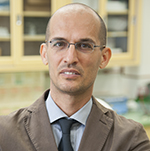Medicine focuses almost entirely on fighting chronic diseases in a piecemeal fashion as symptoms develop. Instead, more efforts should be directed to promoting interventions that have the potential to prevent multiple chronic diseases and extend healthy lifespans.
Researchers writing in the journal Nature say that by treating the
metabolic and molecular causes of human aging, it may be possible to
help people stay healthy into their 70s and 80s.
In a commentary published July 24 in Nature, a trio of aging experts calls for moving forward with preclinical and clinical strategies that have been shown to delay aging in animals. In addition to promoting a healthy diet and regular exercise, these strategies include slowing the metabolic and molecular causes of human aging, such as the incremental accumulation of cellular damage that occurs over time.
The researchers, at Washington University School of Medicine in St. Louis, Brescia University in Italy, the Buck Institute for Aging and Research and the Longevity Institute at the University of Southern California, write that economic incentives in biomedical research and health care reward treating disease more than promoting good health.
“You don’t have to be a mathematician or an economist to understand that our current health care approach is not sustainable,” said first author Luigi Fontana, MD, PhD, professor of medicine and nutrition at Washington University and Brescia University. “As targeting diseases has helped people live longer, they are spending more years being sick with multiple disorders related to aging, and that’s expensive.”
The diseases of old age — such as heart failure, diabetes, arthritis, cancer and Alzheimer’s disease — tend to come as a package, the researchers write. More than 70 percent of people over age 65 have two or more chronic diseases. But, they noted, studies of diet, genes and drugs indicate that interventions targeted to specific molecular pathways that delay one age-related disease often stave off others, too.
“Heart failure doesn’t happen all at once,” Fontana said. “It takes 30 or 40 years of an unhealthy lifestyle and activation of aging-related pathways from metabolic abnormalities such as high blood pressure, high cholesterol and type 2 diabetes to give a person heart failure in his 60s. So we propose using lifestyle interventions — such as a personalized healthy diet and exercise program — to down-regulate aging pathways so the patient avoids heart failure in the first place.”
His own research has highlighted potential benefits from dietary restriction in extending healthy life span. He has found that people who eat significantly fewer calories, while still getting optimal nutrition, have “younger,” more flexible hearts. They also have significantly lower blood pressure, much less inflammation in their bodies and their skeletal muscles function in ways similar to muscles in people who are significantly younger.

Fontana and his co-authors also point out that several molecular pathways shown to increase longevity in animals also are affected by approved and experimental drugs, including rapamycin, an anticancer and organ-rejection drug, and metformin, a drug used to treat type 2 diabetes.
Numerous natural and synthetic molecules affect pathways shared by aging, diabetes and its related metabolic syndrome. Also, healthy diets and calorie restriction are known to help animals live up to 50 percent longer.
But it’s been difficult to capitalize on research advances to stall aging in people. Fontana and his colleagues write that most clinicians don’t realize how much already is understood about the molecular mechanisms of aging and their link to chronic diseases. And scientists don’t understand precisely how the drugs that affect aging pathways work.
Fontana and his colleagues contend that the time is right for moving forward with preclinical and clinical trials of the most promising findings from animal studies. They also call for developing well-defined endpoints to determine whether work in animals will translate to humans. They are optimistic on that front because it appears that the nutrient-sensing and aging-related pathways in humans are very similar to those that have been targeted to help animals live longer and healthier lives.
But challenges abound. The most important change, they argue, is in mindset. Economic incentives in biomedical research and health care reward treating diseases more than promoting good health, they note.
“But public money must be invested in extending healthy lifespan by slowing aging. Otherwise, we will founder in a demographic crisis of increased disability and escalating health care costs,” they write in Nature.
“The combination of an aging population with an increased burden of chronic diseases and the epidemic of obesity and type 2 diabetes could soon make healthy care unaffordable for all but the richest people,” Fontana added.
Fontana, L. Kennedy BK, Longo V. Treat ageing: prepare for human testing. Nature, vol. 511 (7510), pp. 405-406. July 24, 2014
Washington University School of Medicine’s 2,100 employed and volunteer faculty physicians also are the medical staff of Barnes-Jewish and St. Louis Children’s hospitals. The School of Medicine is one of the leading medical research, teaching and patient care institutions in the nation, currently ranked sixth in the nation by U.S. News & World Report. Through its affiliations with Barnes-Jewish and St. Louis Children’s hospitals, the School of Medicine is linked to BJC HealthCare.